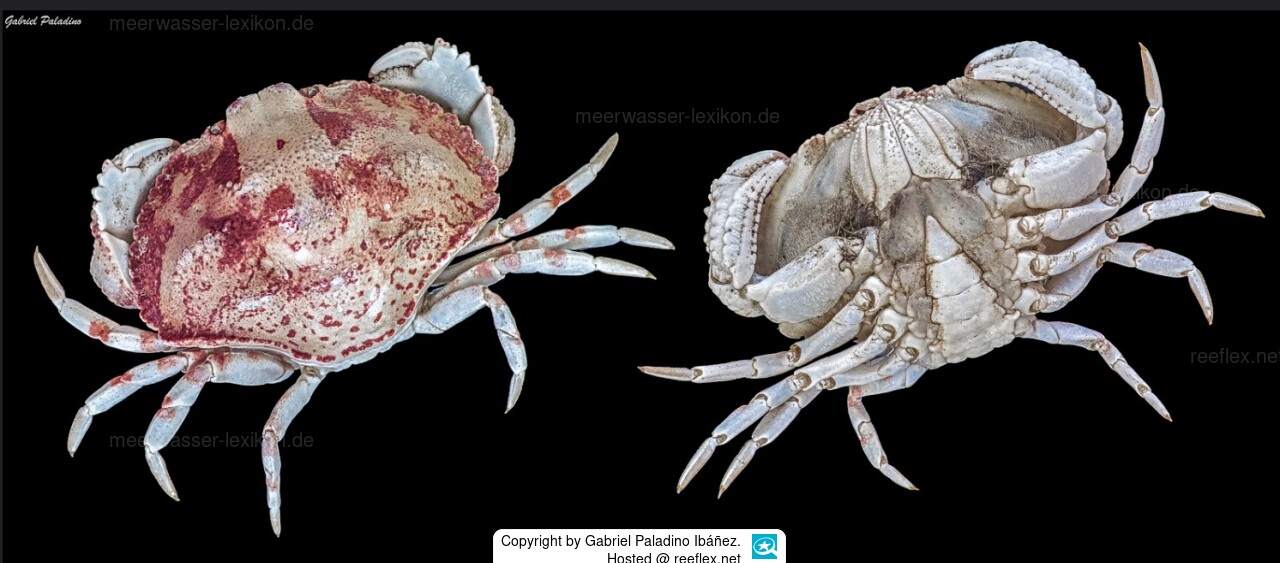Info
Hepatus pudibundus (Herbst, 1785)
Hepatus pudibundus, the spotted pubic crab, is found in the Atlantic Ocean, with a dense population of these crabs in Brazil. It is one of the most common marine crabs there. Females are smaller than males, who also have larger and stronger claws. Sexual dimorphism is clearly pronounced in Hepatus pudibundus.
In the English-speaking world, these crabs are called "spotted box crabs", which results from the original description of the genus Calappa. However, these crabs are currently assigned to the genus Hepatus.
These crabs are sexually mature when their shells are between 30 and 40 mm wide. The life stage of the crab does not affect the depth at which they are found. Crabs of all life stages have been found at all depths. Spotted box crabs are found in shallower waters in the summer months (10–20 m) and in deeper waters in the winter months, but can be found at all depths year-round. In general, females are more common than males.
When conditions are unfavorable or predators are nearby, Hepatus pudibundus burrows into sediments of silt, clay or fine sand for protection.
While the crab feeds on phyto- and nanoplankton, detritus and macrofeeding fauna as well as molluscs, annelids and foraminifera, the crab larvae live on plankton.
The spotted box crab is often caught as bycatch of the shrimp species Xiphopenaeus kroyeri. However, the crabs are sorted out and thrown back into the sea. Although many of the crabs survive the sorting process and are thrown back into the sea, fishing still tends to impact population numbers because there are very few eggs or, if any, young females during the fishing off-season.
Synonymised names
Calappa angustata Fabricius, 1798 · unaccepted > junior subjective synonym
Cancer princeps Herbst, 1794 · unaccepted
Cancer pudibundus Herbst, 1785 · unaccepted > superseded combination
Hepatus calappoides Lamarck, 1818 · unaccepted > junior subjective synonym
Hepatus fasciatus Latreille, 1803 · unaccepted > junior subjective synonym
Hepatus tuberculatus de Saussure, 1858 · unaccepted > junior subjective synonym
Hepatus pudibundus, the spotted pubic crab, is found in the Atlantic Ocean, with a dense population of these crabs in Brazil. It is one of the most common marine crabs there. Females are smaller than males, who also have larger and stronger claws. Sexual dimorphism is clearly pronounced in Hepatus pudibundus.
In the English-speaking world, these crabs are called "spotted box crabs", which results from the original description of the genus Calappa. However, these crabs are currently assigned to the genus Hepatus.
These crabs are sexually mature when their shells are between 30 and 40 mm wide. The life stage of the crab does not affect the depth at which they are found. Crabs of all life stages have been found at all depths. Spotted box crabs are found in shallower waters in the summer months (10–20 m) and in deeper waters in the winter months, but can be found at all depths year-round. In general, females are more common than males.
When conditions are unfavorable or predators are nearby, Hepatus pudibundus burrows into sediments of silt, clay or fine sand for protection.
While the crab feeds on phyto- and nanoplankton, detritus and macrofeeding fauna as well as molluscs, annelids and foraminifera, the crab larvae live on plankton.
The spotted box crab is often caught as bycatch of the shrimp species Xiphopenaeus kroyeri. However, the crabs are sorted out and thrown back into the sea. Although many of the crabs survive the sorting process and are thrown back into the sea, fishing still tends to impact population numbers because there are very few eggs or, if any, young females during the fishing off-season.
Synonymised names
Calappa angustata Fabricius, 1798 · unaccepted > junior subjective synonym
Cancer princeps Herbst, 1794 · unaccepted
Cancer pudibundus Herbst, 1785 · unaccepted > superseded combination
Hepatus calappoides Lamarck, 1818 · unaccepted > junior subjective synonym
Hepatus fasciatus Latreille, 1803 · unaccepted > junior subjective synonym
Hepatus tuberculatus de Saussure, 1858 · unaccepted > junior subjective synonym







 Gabriel Paladino Ibáñez, Uruguay
Gabriel Paladino Ibáñez, Uruguay


